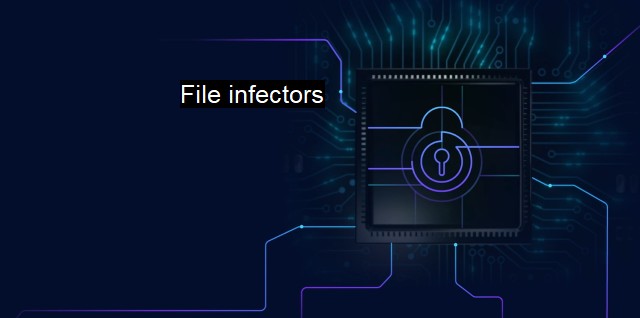What are File infectors?
Unleashing the Threat: Understanding File Infectors - A Comprehensive Exploration of Malware's Most Insidious Techniques"
What are file infectors?File infectors are a type of computer virus that infects executable files such as .exe or .com files.
What does a file infector do?
When a file infected with a file infector virus is executed, the virus code is loaded into the memory of the computer and executed. The virus then searches for other executable files on the computer and infects them by inserting its code into the files.
Some file infectors are designed to cause damage to the computer or steal data, while others are designed to spread quickly and cause disruption. Some file infectors are also capable of polymorphic behavior, which means that they can change their code in order to avoid detection by antivirus software.
How do file infectors spread to other devices?
File infectors can spread to other computers by infecting files on removable storage devices such as USB drives or floppy disks, and then infecting files on other computers that access those devices.
It's important to use antivirus software and keep it up-to-date in order to protect your computer from file infectors and other types of malware.
How can you protect your computer from file infectors?
To protect your computer from file infectors, you can take the following steps:
1. Install antivirus software: Antivirus software can detect and remove file infectors from your computer.
2. Regular OS and software updates: Keep your operating system[a] and software updated. Updates often contain security patches[b] that address vulnerabilities that file infectors could exploit.
3. Be careful when downloading files: Only download files from reputable sources, and be cautious of email attachments and links from unknown senders.
4. Disable autorun: File infectors can spread through removable media such as USB drives. Disabling autorun can prevent the malware from automatically executing when the media is inserted.
5. Use strong passwords: File infectors can gain access to your system if you have weak passwords. Use strong passwords that are unique to each account.
6. Back up your files regularly: In the event that your computer is infected, having a backup of your files can help you recover them without having to pay a ransom or losing them altogether.
[a]link to cyberpedia
[b]link

File infectors FAQs
What are file infectors?
File infectors are a type of malware that infects executable files on a computer. They can copy themselves to other files, causing the infection to spread throughout the system.How do file infectors infect files?
File infectors infect files by inserting their code into the executable file. Once the file is executed, the code is executed along with it. The infected file then becomes a carrier for the virus, which can spread further.What can file infectors do to a system?
File infectors can cause a range of damage to a system, such as degrading performance, corrupting files, and stealing sensitive information. They can also spread quickly and compromise other systems on a network.How can I protect my computer from file infectors?
To protect your computer from file infectors, it's important to have up-to-date antivirus software installed. Regularly scan your computer for viruses, and avoid downloading files or clicking on links from unknown sources. Keep your operating system and software updated with the latest security patches, and avoid using pirated software.| | A | | | B | | | C | | | D | | | E | | | F | | | G | | | H | | | I | | | J | | | K | | | L | | | M | |
| | N | | | O | | | P | | | Q | | | R | | | S | | | T | | | U | | | V | | | W | | | X | | | Y | | | Z | |
| | 1 | | | 2 | | | 3 | | | 4 | | | 7 | | | 8 | | |||||||